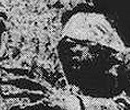
1982:
LEARNING TO COPE
WITH COWARDICE
The opening salvo must have blown a few minds at the time5, but hasn't aged all that well in my opinion. Perhaps best listened to as a prototype for things to come, its collision of dub with extreme frequencies is compelling in places, but just messy in others.
Tracks like Liberty City have a great acidy bass-line and ghostly female backing vocals but Mark's voice is too high up in the mix, and sounds strained. The lyrics don't help either, sounding very much like they can't escape from the 80's bleak urban aesthetic6.
Blessed Are Those Who Struggle works as a preview for later work - featuring lift noises and a melody being pulped into submission by distortion and echo.
The second side is less fractured, even ordered in places. Some of the tracks actually flow quite nicely, which is refreshing after the sometimes excessive dub work outs of side one.
Don't You Ever Lay Down Your Arms is credited to W. Brooks and features some great reggae-esque horns and skanking piano. A pretty restrained track by the Maffia's standards!
The Paranoia of Power is a bit of a cringe - white-boy politico-reggae. Some nice psychogeographical imagery ("Beneath The City Streets"), which is marred by the grim fetishisation of oppressive architecture ("in the concrete of the bunkers") and a call to arms ("let's storm the citadels"). All of this sounds kitsch at best these days - it's just too literal. Mark Stewart's later work is far more satisfying because it hints at the roots and effects of oppression (including power relationships and other, less tangible, aspects of capitalist relations) rather than focussing explicitly on the symptoms.
To Have The Vision was later echoed by Gary Clail on his classic "End of the 20th Century Party" album (which Stewart wrote most of the lyrics for).
Perhaps the main reason to get hold of a copy of this album today would be for the last track, Jerusalem. The scum-sucking politicians of New Labour and the Conservatives have both laid claim to Blake's anthem. In the process there has been an attempt to create some kind of definition of "England" as a nation. The sort of nationalistic distillation which added weight to the manipulations which brought so many working class kids to the trenches of World War One. Mark Stewart perhaps has more claim to Blake's legacy. It's clear from his texts and the images he uses that he's had visions of "England" that are both beautiful and horrific. The fact that the track is dubbed to fuck also provides a kick in the teeth to people who like things nice and tidy, who hark back to the Empire, the stiff upper lip, nicely clipped lawns and the ordered tyranny against everyone not male and upper class that is "our" proud heritage.
It's probably worth pointing out that the history of "madness" in music is something that has always gone hand in hand with Mark Stewart's output. Certainly he has been portrayed in the press as being dangerously paranoid, and rumours abound as to "no-shows" at On-U Sound gigs being due to hospitalisation. As with Lee Perry, there is a nice little box for people who ask too many questions, admit to having problems, come from working class backgrounds and dare to put it all on a record. That box is the "mad" box and once you're in it you are guaranteed a certain underground acceptance, complete with the usual parade of black clad ghouls who gloat about other people's suffering/deviance. Oh, and you also get to be successful after you're dead or have managed to hold on for so long. Perhaps one of the issues that the Mad Pride movement could address would be madness as counter-cultural marketing tool - the recuperation of psychosis.
The track itself continues the theme of a disregard for copyright kicked off by The Pop Group, phasing an un-credited choral version of the song in and out of the mix. Surprisingly, this version has never been aired at the Last Night of the Proms.
From the beginning to Tackhead… the Maffia mutates.
Stewart had been aware of Doug Wimbish (bass), Keith LeBlanc (drums) and Skip McDonald (guitar/keyboard) and their seminal work as the Sugarhill Gang, but was amazed to see them do a London gig (as Fats Comet) at the Language Lab in the mid-80s: "It was this tape they done with like rockets going off and drums that sounded like steamhammers. I was going mental playing it to everyone." Especially Adrian Sherwood, who eventually tracked them down and drew them in to the On-U conspiracy.
The trio formed the new Maffia and came to be known as Tackhead.

1985:
AS THE VENEER OF
DEMOCRACY STARTS TO FADE
- Adrian Sherwood
This is without doubt one of the heaviest albums ever made. Jack Dangers of Meat Beat Manifesto once stated that their initial aim was to make a record more extreme than this. They didn't succeed, but that is just a small indication of how influential this classic record has been.
Passivecation Program sets the agenda for the rest of the LP by being wickedly harsh, dubby and funky. If electro is produced by smiling party robots from outer space, this track is their output after they've discovered the cruel realities of this planet's economy after going rusty on the scrapheap7.
The track was a highlight of the Maffia's live set at the time:
"Basically the live Maffia experience was just like seeing Tackhead - i.e. a brain-pulverisingly intense experience, the closest music could get to all-out apocalypse and still be endurable - but with the addition of a front man who projected this incredible political/social paranoia vision which twisted the energy up yet another notch. He was actually a very focussed performer, he wasn't obviously in need of help to function, but he wasn't 'controlled' in the sense of being a cynical fake. He could, quite simply, rock the mic like a motherfucker. Watching him bouncing up and down and calling out 'Operation Passivecation' had this amazing propulsive energy. There's no way the On-U story would have happened without him."
- Paul Meme
Bastards is like finding yourself in the middle of a military installation without security clearance. Klaxons, layer upon layer of distortion and Stewart shouting "This is a restricted area" through a megaphone might not be everyone's idea of a good listen, but hearing Mark's voice switching between oppressor and oppressed characters is pretty compelling in my book - particularly when coupled with William Burroughs offering some words of advice…
Hypnotised was the obvious single - electro-pop with bells on (literally!). It still sounds fresh today as part of the Stereo MCs acclaimed 'DJ Kicks' mix CD.
The title track is a downtempo affair featuring Mark intoning various texts relating to surveillance technology and the breakdown of society. It's easy to laugh at "Conspiracy Theories". They are so much a part of the commodification of opposition that they're now best seen as part of Control's arsenal of defences. On the surface, "parapolitics" allows anyone who tries to look behind what is presented to them by the conventional media to be labelled as a neurotic crank. On a deeper level, the actual process of completely immersing yourself in "suppressed" reports, black propaganda and research material that is produced by people with an axe to grind can lead to developing a completely alienated outlook which undoubtedly drives some people loopy. There is also an established trick of flooding the market with so much conflicting information that it is impossible to draw a sensible conclusion other than "something dodgy is going on". For example, checking out all of the material now available about the JFK assassination alone would require years and years of serious study. The trick, I would guess, is to try to retain a sense of humour and to walk the thin line between ignorance and obsession.
A woefully brief NME piece from just before the LP was released illustrates this pretty well, with the interviewer clearly trying to portray Stewart as being a headcase, and Mark being deliberately ambiguous about whether he is serious or not:
"Sure enough our conversation slid rapidly into the realms of the bizarre. 'Of course I know people who are under surveillance,' he claimed at one point, getting up to close the door, 'I'm under surveillance because my Dad has Grade A security clearance and access to uranium.' You mean you're being watched? 'I'm not under surveillance,' he countered, donning a pair of mirror shades, 'I'm a vegetarian'. Looking straight over my shoulder, he laughed with a sudden, unexpected burst."
It's not for me to make any judgements about Mark's state of mind - that sort of labelling is entirely counterproductive as far as I'm concerned. The reason "Veneer" is such a classic album is the rich atmosphere of dread and confusion that it evokes. It could be argued that you have to be fairly warped to enjoy (or produce) this kind of thing. But it could just as easily be argued that being warped is the only natural response to the logic of capital.
A lot of the lyrical content here influenced the "Control Data" issue of Vague magazine, including the obligatory post-punk slag off collage in a later issue!
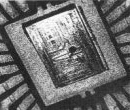
1987: MARK STEWART
- Tricky
The microchip on the cover continues the theme that all is not rosy in the 20th century cyber brave new world. It prefigured the dystopian vision and love/hate relationship with technology that characterised techno, which had been evolving simultaneously in Detroit and Chicago for two years. Apparently this album was not too well received by the fans at the time, the main criticism being that the tracks were too long and that it wasn't an identikit copy of "Veneer". Certainly the tracks are long enough, but I guess it boils down to whether you are used to three minute pop songs, or the endless groove of Shaka doing a "version excursion". The increasing length of the tracks reflected Stewart's customary prescience for the future of electronic music.
This LP is a paen to plagiarism - the bulk of the lyrics come from other sources. It's all the better for it. Not because Mark isn't a great lyricist, but because he chooses who to steal from (and how to reinterpret it) well. The main themes are raw emotions like love, anger, lust and… alienation?
Survival kicks things off with lyrics grabbed from the Grand-Master Flash and the Furious Five track of the same name (echoing the Maffia's previous incarnation as the Furious Five's backing band). Mark's vocals make mincemeat of the way that "the strong survive" is usually portrayed. The vulnerability and dread in his voice completely subvert any notions of puffed up Nietzschean "strength" as being something you can get by being in the right club/reading the right books/listening to the right music. Other lyrics are sourced from Jacques Brel's "My Death".
The sample at the beginning of Hell is Empty pre-empts the current furore about the militarisation of space (the prehistory of the Association of Autonomous Astronauts). The track itself is basically Keith LeBlanc's "Subject - Object" (from his massively under-rated "Major Malfunction" LP) with Mark's vocals added. Again this shows the reggae influence - producers in Jamaica frequently rework the same rhythm tracks because of economic necessity - this process has given birth to dub, rapping and "remix culture".
Stranger has been credited as a blueprint for trip-hop (according to UK newspaper The Independent, no less): a mellow classical refrain (actually Eric Satie's "Gymnopaedies") backed with a mellow breakbeat. It's certainly good to see Mark getting some credit for the "Bristol Sound" - by all accounts he was a key player throughout the 80s. Grant from Massive Attack remembers him getting on the mic with seminal hip hop crew The Wild Bunch "singing farmer's songs and total obscenities in this real deep voice: 'Fuck off, yer bums, fuck off!' over heavy Def Jam beats!"
Mark went on to become a mentor for Tricky, giving him crash space, forcing him onstage and recording his first post-Massive Attack tracks. Tricky, who can best be described as "eccentric" himself, remembers the sessions with some bemusement:
"Mark's quite a mad geezer… he brought loads of disorder to the studio when I was recording 'Aftermath'. He brought all these people with him; he just goes around clubs and picks up people on the way. In the end, we had a massive row in the studio.
"The track is so tense because of him being around, he got on the mixing desk and put on reverb and echo and just fucked around with everything. We took it all off, but there's still a lot of his spirit on the record."
There are two cuts of Forbidden Colours on the album - as in the Ryuichi Sakamoto track from the Yuko Mishima-inspired film. The tracks buckle under the weight of Doug Wimbish's slap bass ("slapped around" bass?) and the dub is eventually submerged under wobbly tape and industrial dub effects.
Fatal Attraction rounds things off with an absolutely shocking mash up of Donna Summer's "I Feel Love" featuring deranged ranting from Mark, an outrageous version of the original bass-line and some breathy female vocals. The refrain of "contagious" underlines the paranoid intensity that accompanied the onset of the AIDS crisis. Heavy, in all senses of the word. It would be nigh-on impossible to do this sort of thing these days without it being a straight remix or a knowingly ironic "tribute".
For all its faults, this is one of my favourite Mark Stewart LPs - the beats are certainly wicked - culled from the same "classic" era of On-U Sound as the early Tackhead twelves, and the lyrics are for the most part bang on and well delivered. It's also a lot more accessible than "Veneer".
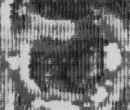
1990: METATRON
- Sol Yurick, Metatron (Semiotexte)8
"My political background interests are the French ultra-left, the SI, Artaud and the dissident surrealists, the dutch provos, 60's and 70s fringe groups… now? There's a danger of getting stuck in a room with your head in a Semiotexte book, no I'm still on top of it…"
Hysteria was another almost-hit - a classic example of a warped pop song that does all the right things, but is just that little bit too edgy for the mainstream. I even have a vague recollection of the video for this making it onto the Chart Show. For me, this track will always conjur up memories of a hot summer in Haringey spent trying to deal with a deeply disturbed Japanese girl who had ended up living in our house.
Skip McDonald's guitar work is to the fore here, especially on tracks like Collision and Mammon, making this the most "rock" Mark Stewart LP. That said, the rock in question is more akin to granite rather than Guns 'n' Roses.
These Things has one of the definitive wibbly harsh acid bass-lines which made everyone go mental when it was previewed at an On-U Sound party at the Town and Country Club one time. "A human time bomb/ an accident waiting to occur/ he said he did it because he was bored/ these things/ these things/ these things… happen." An absolutely outstanding track that pulsates with a tensile funk.
My Possession continues the techno vibe, even including some piano stabs.
A lot of the lyrical content focusses on the individual rather than society as a whole. For example Shame deals with being the black sheep in the family: "Mother says she can't stand the neighbours talking" - another appropriated lyric, this time from an early David Bowie song entitled "I can't help thinking about me".
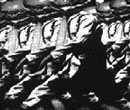
1996: CONTROL DATA
The introduction of Simon Mundey pushes the Maffia into the background and gives the album a more technoey feel. Dream Kitchen is almost poppy, but the "You love… objects" refrain gives the game away - a glossy critique of commodity fetishism.
Elsewhere the influence of UK soundsystems remains, with dubbed out vocals and synthesised horns (for example on Forbidden Love). In fact Scorpio with its siren effects and steppers rhythm could be a serious UK Dub track, were it not for the tortured vocals.
The sleevenotes also make some of Stewart's ideological and philosophical influences explicit with a number of (largely American) parapolitical and ultra-left journals credited.
Consumed opens with a thrashy quote of the bass line from Grand-Master Flash's "White Lines" and continues in this vein. it's a punky techno party…
Simulacra seems to re-version the rhythm from Gary Clail's "Rat Race". The jackhammer beats make this crushingly hard techno, but the distorted vocals have the unfortunate side-effect of conjuring up images of the Slimelight/EBM/Front 242 scene.
The Half takes up a common refrain from reggae and inverts it. For example Pablo Gad's UK Soundsystem smash "Hard Times": "Do you really wanna know - about the half that's never been told? Do you really wanna know - what happened to our silver and gold?". Gad's song relates to the hidden history of oppression from a sufferer's viewpoint, whereas Stewart's "From Operation Gladio to the Gemstone Files/ From the Nag Hammadi Gospels to the Dead Sea Scrolls/ the half that's never been told" is also about hidden history, but is more to do with the data that the control process hides from those it oppresses. Perhaps the message is no longer that of "Hard Times" in Babylon but the first steps towards understanding how these circumstances have come about - an investigation into the mechanisms behind oppression.
The live shows accompanying the release of the album were extremely well received. The gig at the Astoria in London saw Mark and the crew on top form - the energy and vision undiminished after a break of several years.
However, throughout the album there is a sense that the huge chasm between Mark Stewart and pretty much everyone else producing music is being closed. Perhaps this is a deliberate attempt to come in from the cold after so many years in the wilderness, but it may just as well be that the technology now allows easier access to extreme sounds and textures. Time for a rethink?
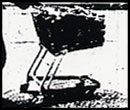
1998: CONSUMED - THE REMIX WARS
Indeed, we only had to wait for two years to witness some evidence of a leap ahead of the pack. This EP contains some radical reworkings of one of the tracks from Control Data.
Ultraviolence come in with that gabba doof doof doof doof business and some nice accelerating bpms and breakdowns. For a gabba track this manages to be (relatively) funky.
Alec Empire is perhaps on the surface an obvious collaborator, having a similar interest in both harsh sounds and left politics (although he is keener on more literal polemic and sloganeering). That said, the DHR label represents the mainstream pole of "breakcore" and I can't help thinking that Mark's influence on the more underground elements (Datacide, Ambush, Dead by Dawn, etc - and now people like DJ /Rupture and the Razor X label) has been more vital and would reap more rewards if the favour was returned. Bring on the DJ Scud and Nomex remixes next time!
The mix by The Program was a real surprise. I was expecting a full-on No U Turn tech-step assault, but this is wonderfully brooding instead - some great dark textures and a downtempo break.
My main criticism here would be that the remixes do not really go far enough in hacking the "original" to pieces. For example, the vocals are pretty much untouched (although often it is only the title which is included) - out of politeness? A mistake. Perhaps it would be more interesting to render Mark's voice unintelligible or bring in other voices - rudebwoy MCs or r'n'b girlies.
However, 'Consumed' bodes well for the future collaborations. With Mark mentioning an interest in both 2-step garage and thrash metal in interviews things will continue to be interesting.
NOTES
-
Posters accompanying the records included statistics on police brutality or world poverty, and anti-fascist information.
-
The "How Much Longer…" LP includes a track by the Last Poets in its entirety.
-
For example getting Dennis "Blackbeard" Bovell in to dub up their "Y" album
-
New Age Steppers included John Waddington and Bruce Smith from The Pop Group, Style Scott, George Oban of Aswad, Bim Sherman, Ari Up from The Slits and a young Neneh Cherry. On-U's first release featured New Age Steppers on side 1, London Underground on side 2.
-
Indeed, the album was included in The Wire's "100 Records That Set The World On Fire (When No One Was Listening)" in September 1998 (issue 175). But they do get the personnel in the Maffia confused with the later version.
-
An unedited version of this track appears on the Cathexis Records compilation "You Bet We've Got Something Against You".
-
Yurick's book deals with the city, issues around technology, information, alienation. He is also the author of the novel "Warriors" which was later made into the classic film of the same name. "Warriors" deals with aspects of the city that are hidden from most citizens - the codes and customs of teenage gangs and the maps that their interactions describe.
Links/Sources/Copyright/Acknowledgements
phunk | dub | anarcho-punk | industrial